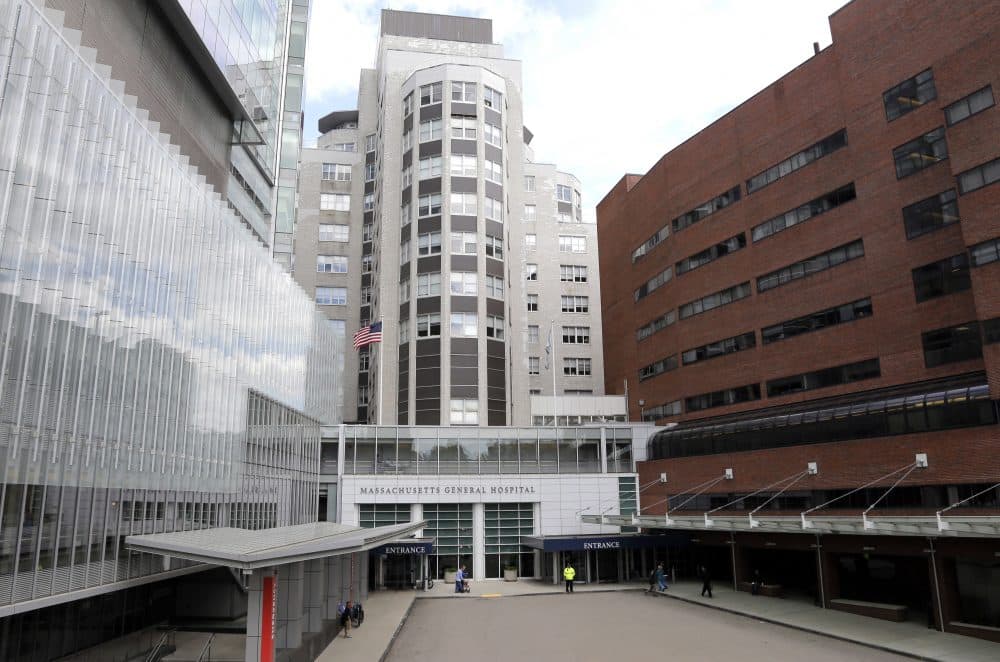Advertisement
How Mass. Providers Are Responding To A Call For 'Sanctuary Hospitals'

For immigrants in the country illegally, the fear of running into U.S. Immigration and Customs Enforcement (ICE) agents has made some public places appear threatening. In the current environment, that can include a visit to the emergency room.
For that reason, a recent opinion piece in the Journal of the American Medical Association called for the establishment of so-called 'sanctuary hospital' policies. But some Massachusetts health care providers say they only have so much power.
'Once ICE Walks In, It's Too Late'
In the chaos of a hospital, staff depends on procedure. So most hospitals have policies on interactions with law enforcement. But what happens when an immigration agent asks about a patient?
"Yeah, that's a good question," said Rachel Labas, a spokesperson for Signature Healthcare Brockton Hospital. "I mean, we don't have any specific policies and to my knowledge, there's been no discussion around being kind of a safe haven hospital or anything like that. We're required by law to treat all patients, you know, without regard to their status, their immigration status, so that's not something that we've encountered."
With President Trump's new, tougher immigration enforcement actions, many in the health care field may be thinking about this question for the first time. Advocates for immigrants' rights say hospitals would be wise to prepare for these encounters in advance.
Sarang Sekhavat, federal policy director for the Massachusetts Immigrant and Refugee Advocacy Coalition, said it's crucial for hospitals and health care providers to have procedures in place.
"Once ICE walks in, it's too late to be dealing with this," Sekhavat said. "It's really important, I think, that all the staff at hospitals really understand what these policies are and how they should deal with ICE."
'We've All Struggled With What We Can Say'
As of now, ICE considers hospitals sensitive locations, along with schools and churches. This means agents will often avoid making arrests in these places. But so-called sensitive locations are not enshrined in law. They were established in a 2011 Department of Homeland Security memo and, Sekhavat said, could be rescinded with a stroke of the president's pen.
Joshua Abrams is an attorney for Partners HealthCare, the largest provider in the state. Like Signature Healthcare, it has no specific sanctuary policy in place. But, Abrams said, staff can try to remove themselves from the equation to an extent.
"We certainly have advised clinicians not to proactively ask about immigration status, not to document it unless it's for some reason necessary for the care being provided," Abrams said.
In other words, if they don't have the information, they can't share it.
Abrams says hospitals need to be careful, though, not to overstate what they can promise. "We also need to acknowledge that there are some times, when appropriate legal procedure has been followed, when some information is going to have to be provided to authorities," he said, "and that's true whether that authority is ICE or any other law enforcement authority, whether that's a warrant, a subpoena or some other appropriate legal process."
Advertisement
Some doctors say the situations around immigration enforcement are so unpredictable right now, they wouldn't feel honest telling a patient that they can protect them from ICE.
"We have to be careful about acknowledging the realities on the ground and also outreaching to patients," said Dr. Elisabeth Poorman, who works in Everett as a primary care physician with Cambridge Health Alliance. "And I think we've all struggled with what exactly can we say," she explained.
Poorman is unsure whether establishing 'sanctuary hospital' policies is the best way to communicate that message. Instead, she'd prefer a universal set of policies from the industry. "It's extremely important for us to communicate to everyone in Massachusetts that they will not be in danger if they seek needed medical care."
In May, state Attorney General Maura Healey's office provided general guidance to health care providers on how to interact with immigration officials. Part of that advice was for providers to put a policy in writing.
In a statement, Anuj Goel, who's vice president for legal and regulatory affairs for the Massachusetts Health and Hospital Association, said the MHA partnered with the attorney general's office in providing guidance to hospitals on how to handle situations "where enforcement agents may be seeking information on patients or employees." The statement went on to say: “While we are unaware of any hospitals that may be seeking so-called 'sanctuary status,' Massachusetts hospitals, health systems and affiliated care providers are deeply committed to serving all patients in need of care."
Officials from both Boston Medical Center and Tufts Medical Center provided statements reinforcing their commitment to providing a safe environment to all of their patients. Neither facility mentioned a specific 'sanctuary' policy.
This segment aired on October 30, 2017.
